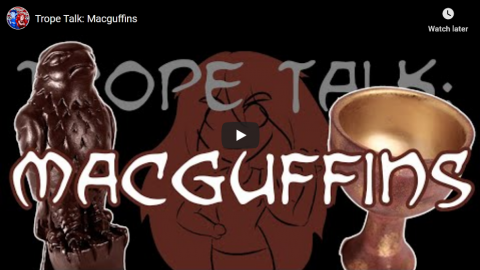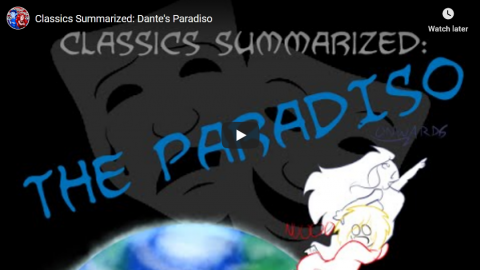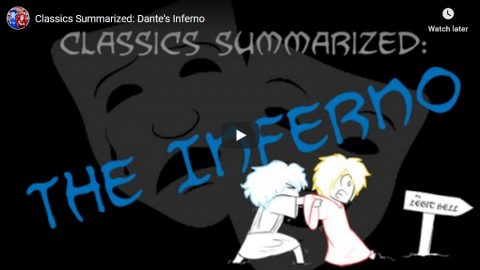Overly Sarcastic Productions
Published 6 Mar 2020Edit: DANG IT YES I MEANT THOR 2 EVERYONE LEAVE ME ALONE
Everybody wants ’em! Very few people get ’em! Sometimes, the things we call macguffins turn out not to be macguffins at all! But what IS the elusive macguffin, and how do we go about understanding, writing, OR acquiring it?
Got a favorite macguffin or macguffin-centric storyline? Drop it in the comments!
Our content is intended for teenage audiences and up.
PATREON: https://www.Patreon.com/OSP
MERCH LINKS: https://www.redbubble.com/people/OSPY…
DISCORD: https://discord.gg/h3AqJPe
OUR WEBSITE: https://www.OverlySarcasticProductions.com
Find us on Twitter https://www.Twitter.com/OSPYouTube
Find us on Reddit https://www.Reddit.com/r/OSP/
March 8, 2020
Trope Talk: Macguffins
March 5, 2020
QotD: Champagne
I only drink champagne when I’m happy, and when I’m sad. Sometimes I drink it when I’m alone. When I have company, I consider it obligatory. I trifle with it if I am not hungry and drink it when I am. Otherwise I never touch it — unless I’m thirsty.
Lily Bollinger
March 2, 2020
History-Makers: Anna Komnena
Overly Sarcastic Productions
Published 28 Feb 2020She’s a Princess! She’s a Poet! She’s a Historian! She’s Anna Komnena — the COOLEST writer in the Byzantine Empire! On this episode of History-Makers, jump into the reign of Alexios Komnenos from the perspective of his daughter Anna, and learn about the emperor who saved the Byzantines from certain doom, as well as the traits that make Anna’s Alexiad a masterpiece.
This video was edited by Sophia Ricciardi, AKA “Indigo”.
Our content is intended for teenage audiences and up.Sources & Further Reading: The Alexiad — obviously, what are you waiting for? (Also Norwich’s Byzantium)
PATREON: https://www.Patreon.com/OSP
DISCORD: https://discord.gg/h3AqJPe
MERCH LINKS: https://www.redbubble.com/people/OSPY…
OUR WEBSITE: https://www.OverlySarcasticProductions.com
Find us on Twitter https://www.Twitter.com/OSPYouTube
Find us on Reddit https://www.Reddit.com/r/OSP/
February 26, 2020
QotD: Chardonnay
What seemed to me to make white Burgundies worth the effort was the fact that they tended to have more character, to be better balanced, more elegant … more, how you say in English … more Catherine Deneuve. More Jules and Jim than Die Hard; less top-heavy and more food-friendly than New World wines. On the other hand, it was and is quite possible to spend forty bucks on a bottle that tastes like it has been barrel-fermented with a big clump of terroir, or with Pierre’s old socks, or possibly his former cat. Yikes! Rather too much character, mon cher.
Jay McInerney, Bacchus & Me: Adventures in the Wine Cellar, 2002.
February 22, 2020
Classics Summarized: Dante’s Paradiso
Overly Sarcastic Productions
Published 28 Jun 2015At last! The thrilling conclusion!
Oh god this took so long D:
February 21, 2020
Classics Summarized: Dante’s Purgatorio
Overly Sarcastic Productions
Published 24 Apr 2015Funny story: That half-second-long scream? Took me about four hours to record. I’m really bad at screaming and/or laughing on demand, so I sat down with some videos of the Game Grumps playing horror games and recorded my reactions to use whenever I need them. I now have a fifteen-second sound file of laughter and screams with varying degrees of shameful girliness.
Part 2 of the centuries-old trilogy has finally been summarized! Surely you’ve awaited this moment with bated breath. As always, I am happy to oblige.
February 20, 2020
QotD: Preventing bureaucratic mission creep
The mission creep that is the effect of those not slumbering in meetings and thus adding another bright idea to the tasks the organization attempts is not restricted to the public sector.
Private companies are just as vulnerable. However in that private sector we have a mechanism by which the seemingly inevitable bureaucratization is dealt with. Once it happens, the organization goes bankrupt and is removed from the scene. What we need is a similar system to deal with this process in the public sphere.
I don’t, given the above, find it at all remarkable that the WTO is regarded as succumbing to these forces, nor the UN, Amnesty, the European Union or even our own domestic governments (just how did the interstate commerce clause become a justification for Congress to restrict something that is not interstate and is not commerce?). I think it inevitable.
Various solutions appear to be available, the French one might be an example. Put up with it for 50 years then have a revolution and start again. Perhaps the answer is never to allow the public bodies to have much power in the first place, a solution that hasn’t really been tried anywhere. The Italian one? Let the system carry on adding ever more layers but ignore it? Stalin’s? Every 15 years or so shoot the bureaucrats?
All such methods have their attractions and their faults but a solution we do need to find. For one of the lessons I take from the history of the 20th century is that we don’t actually want to be ruled by those who stay awake in committee meetings.
Tim Worstall, “‘Any Organization Will, In the End, Be Run By Those Who Stay Awake in Committee'”, Ideas in Action, 2005-06-23.
February 19, 2020
Classics Summarized: Dante’s Inferno
Overly Sarcastic Productions
Published 21 Mar 2015I’m back, baby!
For this week’s venture into literature, we take a broad look at The Inferno. Hold onto your butts.
PATREON: https://www.patreon.com/user?u=4664797
MERCH LINKS:
Shirts – https://overlysarcasticproducts.threa…
All the other stuff – http://www.cafepress.com/OverlySarcas…Find us on Twitter @OSPYouTube!
February 18, 2020
QotD: Boring old Canada
Canada may be the nicest country on earth. Bad things don’t happen in Canada, or at least not very often, because Canadians are far too nice to let them.
Unfortunately, here in America, bad things are what we call “news”. Canada’s undoubtedly a land of rich blessings for its residents (weather aside), but it makes it a little hard to write about.
Jane Galt, “Blame Canada …”, Asymmetrical Information, 2005-01-18.
February 17, 2020
QotD: Hitchens’ rule of morality
Whenever I heard some bigmouth in Washington or the Christian heartland banging on about the evils of sodomy or whatever, I mentally enter his name in my notebook and contentedly set my watch. Sooner rather than later, he will be discovered down on his weary and well-worn old knees in some dreary motel or latrine, with an expired Visa card, having tried to pay well over the odds to be peed upon by some Apache transvestite.
Christopher Hitchens, quoted by Douglas Murray in “Beware the creepy male feminist: ‘White knights’ like Robert De Niro often turn out to be less than chivalrous”, Unherd, 2019-11-15.
February 15, 2020
The Best Couples in History — Valentine’s Day Special
Overly Sarcastic Productions
Published 14 Feb 2020Happy Valentine’s Day! Celebrate the history of Love with a rundown of these outstanding couples — for better and for worse.
Our content is intended for teenage audiences and up.
This video was edited by Sophia Ricciardi, AKA “Indigo”.
PATREON: https://www.Patreon.com/OSP
DISCORD: https://discord.gg/h3AqJPe
MERCH LINKS: https://www.redbubble.com/people/OSPY…OUR WEBSITE: https://www.OverlySarcasticProductions.com
Find us on Twitter https://www.Twitter.com/OSPYouTube
Find us on Reddit https://www.Reddit.com/r/OSP/
February 13, 2020
February 12, 2020
Rebecca Black, nine years after the release of “Friday”
CNN‘s Scottie Andrew talked to Rebecca Black about her experiences and the reactions to her debut video:
Partyin’, partyin’, YEAH! “Friday,” the accidental anthem of 2011 and an ode to the best day of the week, is officially nine years old.
It became something of a national joke when it debuted. But to a then-13-year-old Rebecca Black, the single’s star, the jokes made at her expense were immensely damaging.
Black, now 22 but still a pop singer, is remarkably well-adjusted for someone whose life was upended by a music video. She marked the 9th anniversary of the song that started it all with a note to her younger self — and advice for her followers to love themselves a little better.
[…]
Black was only in middle school when she filmed the infamous video. She paid a company called Ark Music Factory to write her a song and film a music video for it, starring her and her friends.
It’s not an artistic achievement, but it’s fitting for the young star at its center. In it, Black sways and sings her way through a Friday — she wakes up, she eats cereal, she can’t decide which seat in a convertible to take. Typical teen stuff.
The negative comments rolled in almost immediately, and nearly all of them lambasted Black.
At the time, I linked to a couple of deconstructions of the video that amused me. One was from The Awl:
She offers the camera a hostage’s smile, forced, false. Her smoky eyes suggest chaos witnessed: tear gas, rock missiles and gasoline flames. They paint her as a refugee of a teen culture whose capacity for real subversion was bludgeoned away somewhere between the atrocities of Kent State and those of the 1968 Democratic Convention, the start of a creeping zombification that would see youthful dissent packaged and sold alongside Pez and Doritos.
“Look and listen deeply,” she challenges. An onanistic recursion, at once Siren and Cassandra, she heralds a new chapter in the Homeric tradition. With a slight grin, she calls out to us: “I sing of the death of the individual, the dire plight of free will and the awful barricades daily built inside the minds of all who endure what lately passes for American life. And here I shall tell you of what I have done in order to feel alive again.”
***Ms. Black first appears as her own computer-generated outline: wobbly, marginal, a dislocated erasure. The days of the week flip by accompanied by dull obligations — “essay due” — and tired clichés — “Just another manic Monday …” Her non-being threatens to be consumed by this virtual litany of nothing at all until, at long last — Friday.
[…]
Yet here the discerning viewer notes that something is wrong. Because it is a simple matter of fact that in this car all the good seats have already been taken. For Rebecca Black (her name here would seem to evoke Rosa Parks, a mirroring that will only gain in significance) there is no actual choice, only the illusion of choice.
The viewer knows that she’ll take the only seat that’s offered to her, a position so very undesirable as to be known by a derisive — the “Bitch” seat.
She might well have been better off on the school bus, among the have-nots. But Rebecca Black’s world is so advanced in the craft of evisceration that this was never a consideration. John Hughes died while out jogging, these are the progeny of his great materialist teen-villain, James Spader, a name that would come to be synonymous with desperate sex and high-speed collision. And as she gets in the car Ms. Black’s joy is as patently empty as her liberation.
“Partying, Partying,” she sings, in hollow mantra.
“Yeah!” an unseen mass replies, a Pavlovian affirmation.
The other was from Jeffrey Tucker in the Christian Science Monitor:
Far more significant is the underlying celebration of liberation that the day Friday represents. The kids featured in the video are of junior-high age, a time when adulthood is beginning to dawn and, with it, the realization of the captive state that the public school represents.
From the time that children are first institutionalized in these tax-funded cement structures, they are told the rules. Show up, obey the rules, accept the grades you are given, and never even think of escaping until you hear the bell. If you do escape, even peacefully of your own choice, you will be declared “truant,” which is the intentional and unauthorized absence from compulsory school.
This prison-like environment runs from Monday through Friday, from 8 a.m. to late afternoon, for at least ten years of every child’s life. It’s been called the “twelve-year sentence” for good reason. At some point, every kid in public school gains consciousness of the strange reality. You can acquiesce as the civic order demands, or you can protest and be declared a bum and a loser by society.
“Friday” beautifully illustrates the sheer banality of a life spent in this prison-like system, and the prospect of liberation that the weekend means. Partying, in this case, is just another word for freedom from state authority.
The largest segment of the video then deals with what this window of liberty, the weekend, means in the life of someone otherwise ensnared in a thicket of statism. Keep in mind here that the celebration of Friday in this context means more than it would for a worker in a factory, for example: for the worker is free to come and go, to apply for a job or quit, to negotiate terms of a contract, or whatever. All of this is denied to the kid in public school.
Jeeves & Windsor (Prince Andrew Edition) – Will Franken
Comedy Unleashed
Published 8 Feb 2020An imagined Prince Andrew receives advice from Jeeves about Jeffrey Epstein.
Live at London’s little home of free-thinking comedy.
Gigs every month https://comedyunleashed.co.uk/whatson
H/T to Hector Drummond for the link.
February 11, 2020
Leaving the Left – Part 9: PJ O’Rourke
Economics in the Media
Published 18 Aug 2016“When I got my first paycheck I found that I netted $82.27 after federal income tax, state income tax, city income tax, Social Security, union dues, and pension fund contribution. I was a communist. I had protested for communism. I had rioted for communism. Then I got a capitalist job and found out we had communism already.”
– The Baby Boom, PJ O’RourkeParliament of Whores: A Lone Humorist Attempts to Explain the Entire U.S. Government
Full Interview with Peter Robinson
https://youtu.be/keJYIkxbieg













